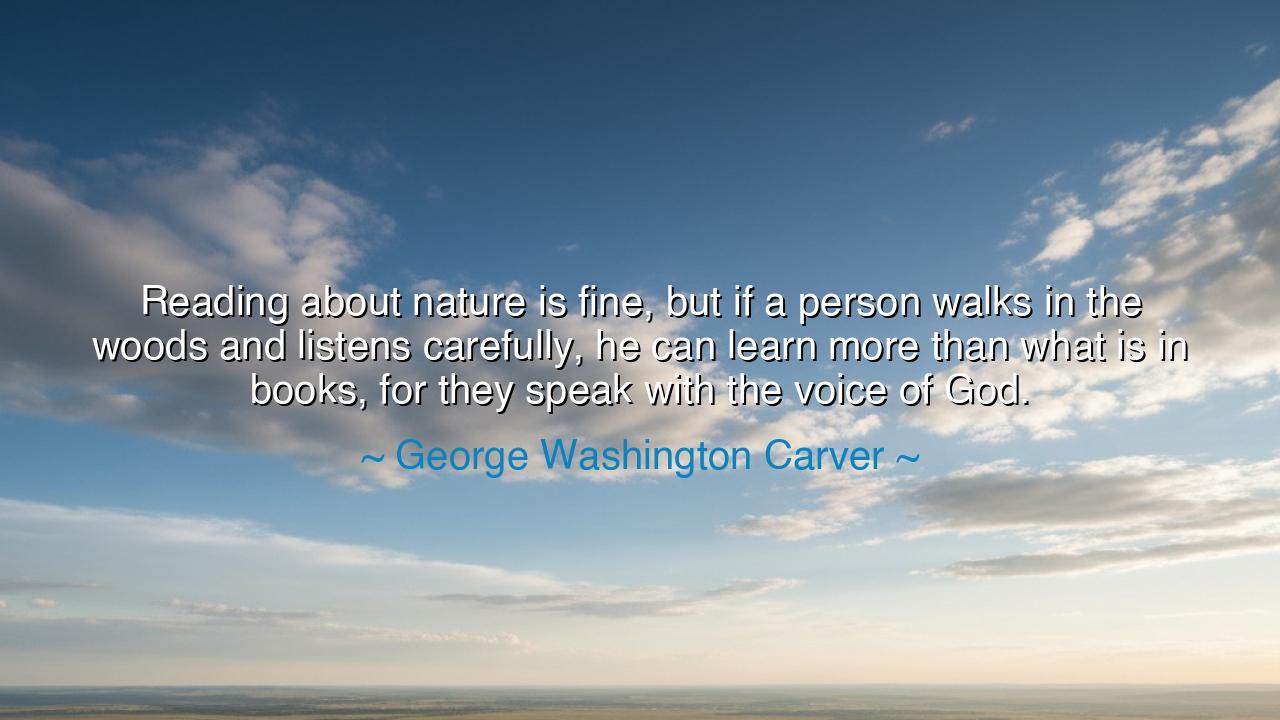
Reading about nature is fine, but if a person walks in the woods
Reading about nature is fine, but if a person walks in the woods and listens carefully, he can learn more than what is in books, for they speak with the voice of God.






George Washington Carver once said: “Reading about nature is fine, but if a person walks in the woods and listens carefully, he can learn more than what is in books, for they speak with the voice of God.” In these words lies the creed of a man who lived close to the soil and who found divinity in the quiet whispers of creation. It is not a rejection of books, but a reminder that written words, however noble, can never fully capture the living breath of the world. For in the rustle of leaves, in the call of a bird, in the silence of the forest, the eternal speaks more clearly than any printed page.
The origin of this truth comes from Carver’s own life. Born into slavery, denied many of the privileges of formal education, he learned first from the fields, from the plants, from the very earth beneath his feet. Before he ever entered a laboratory or a classroom, he was a student of nature herself. It was in this school of open skies and green forests that he received his first lessons in patience, renewal, and wonder. Later, though he became a scientist and teacher, he never forgot that the greatest knowledge was not confined to books, but written in the world around us.
The ancients also understood this truth. The Stoics declared that to live in harmony with nature was to live in harmony with reason and the divine. The psalmist of Israel looked upon the heavens and proclaimed, “The skies declare the glory of God.” And the sages of the East often sought wisdom not in scrolls, but in mountains and rivers. Carver, speaking centuries later, joined this chorus: the woods are not merely background for life, they are living scripture, and he who listens with humility may hear the voice of God.
History offers luminous examples of this lesson. Think of Henry David Thoreau, who withdrew to Walden Pond, declaring that he went to the woods to live deliberately and learn what life had to teach. His time there was a living confirmation of Carver’s wisdom—that the truths most needed are not always found in ink, but in the cadence of water and the rhythms of wind. Or consider John Muir, whose communion with the wilderness inspired the creation of national parks, so that future generations could also hear nature’s voice unspoiled. Both men, like Carver, knew that the woods are a cathedral without walls.
The meaning of Carver’s words stretches beyond nature study—it is about the posture of the soul. To “read” is to know about things; to “walk” and “listen” is to know them truly. A man may read a thousand pages on trees, yet until he stands beneath their shade, breathes their resin, and hears their branches sway, he has not encountered their truth. And in that encounter, the veil thins, and the voice of God becomes audible—not as thunder or command, but as stillness that teaches reverence, patience, and awe.
The lesson for us is clear: books are precious, but they are guides, not substitutes for life. To truly learn, we must step outside, we must see, touch, listen. We must place ourselves in the presence of nature, allowing it to shape our character as much as our knowledge. For in the forest, pride falls silent, and the eternal order reveals itself. Every leaf, every stone, every bird is a teacher if we have ears to hear.
Practically, this means carving time to dwell in creation. Do not let your learning be confined to the page or the screen. Walk the woods, watch the sunrise, listen to the rain, and let these experiences tutor your soul. Bring children to rivers and mountains, so they too may hear the living voice of wisdom. And when burdened or confused, retreat into the quiet of nature; there you may find answers that no argument, no book, no lecture could give.
Thus Carver’s words stand as both testimony and summons: “Reading about nature is fine, but if a person walks in the woods and listens carefully, he can learn more than what is in books, for they speak with the voice of God.” May we heed this wisdom, not only with our minds, but with our feet and our hearts. For to walk in nature is to walk in a classroom crafted by heaven itself, where every whisper of wind carries a lesson eternal.






AAdministratorAdministrator
Welcome, honored guests. Please leave a comment, we will respond soon